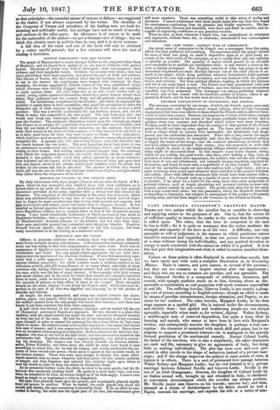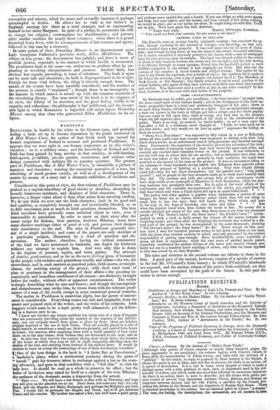• LADY GEORGIANA FULLERTON'S GRANTLEY MANOR.
THERE are two points which the novelist has to consider in observing and applying nature to the purposes of art. One is, that the nature be
of sufficient quality to interest the reader to the extent that his attention is called upon. The other, that the hero be competent to the task he has to fulfil; for it is quite as necessary that the writer meditate the strength and capacity of his hero as of his own. A difficulty, not very amenable to will or judgment, is the manner in which particular nature should be corrected and expanded, so that one person becomes the type of a class without losing his individuality, and any poetical elevation or energy is made consistent with the nature on which it is grafted. It loin this last part that imagination and what is called invention manifest them- selves.
Failure on these points is often displayed in second-class novels, but we have rarely met with such a complete illustration as in Grantley Manor. There is nature, and pure nature, in several of the persons ; but they are too common to inspire interest after one appearance ; and those who are not so common are peculiar, and not agreeable. The hero, Edmund Neville, is a compound of selfishness, meanness, and conceit, with spangle qualities stuck on to him, forming about as dis- agreeable a combination as real puppyiBm with mock romance superadded in real life. The suffering heroine, Ginevra Leslie, is not exactly a pleas- ing sort of person according to English notions; though an effort is made by means of peculiar circumstances, foreign education, and Popery, to ac- count for her conduct. The other heroine, Margaret Leslie, in the first stage appears as a spoiled girL She is natural under the circumstances, and cleverly done : but spoiled and headstrong people are not always agreeable, especially when made so for writers', objects. Walter Sydney, a middle-aged man of reserved disposition, but quite a bean ideal 111 learning and morals, who seems to have been in love with Margaret's mother, and subsequently marries the daughter, is perhaps a true con- ception: the character is sustained with much skill and pains, but is too singular to support a prominent interest—he is analogous to the gravely dressed gentleman of the sentimental comedy. Except Colonel Leslie, the father of the heroines, who is also a singularity, the other characters are rank and file, necessary to give an appearance of body, but doing little or nothing individually. The plot has been over and over pre- sented in older novels in the shape of seduction instead of a private MAX: riage ; and if the change improves the subject in some points of view, it injures it in others. There is a sort of protracted love passage between Walter Sydney and Margaret Leslie; but the real interest is in a private marriage between Edmund Neville and Ginevra Leslie. Neville is. the son of an Irish Orangeman; Ginevra, the daughter of Colonel Leslie by
an Italian second wife, brought up and educated in Italy, in obedienw to convenient circumstances which the novelist can always produce.
Mr. Neville junior sees Ginevra on his travels ; marries her; and then, alarmed at a threat of disinheritance by his father should he wed. a Papist, conceals his marriage, and exposes his wife to a series of mil.
conception and misery, which for mean and cowardly baseness is perhaps unexampled in fiction. He allows her to visit at her father's in England, meeting her there as a total stranger, and so representing himself to her sister Margaret. In spite of a pledge, he persecutes his wife to change her religion ; contemplates her abandonment ; and pursues other similar conduct for nearly three volumes ; when there is a grand theatrical brain fever, with its accompaniments of late remorse and agony, followed in this case by a recovery.
In some points of view, G-rantley Manor is an improvement upon Lady Georgiana Fullerton's previous work, Ellen Middleton. The villany is less gross; the denouement less painful; and there is more of poetical justice, especially in the manner in which Neville is tormented. The prominent fault is the same—an endeavour to produce effect by un- pleasing or revolting circumstances and persons. Another fault, less obvious but equally pervading, is want of substance. The book is spun out by mere talk and situations; its bulk is disproportioned to its weight. Except for these vital defects, the thing is cleverly enough done. The causes of the events have been carefully considered, and the conduct of the persons is mostly " explained " ; though there is an incongruity in the manner in which nature is mixed up with the common materials of the circulating library. The true merit of the book is in the elegance of its style, the felicity of its sketches, and the good feeling visible in its remarks and reflections : the philosophy is but indifferent, and the favour- able light in which Romanism is regarded will rather injure Grantley Manor among that class who patronized Ellen Middleton for its re- ligion.



























 Previous page
Previous page